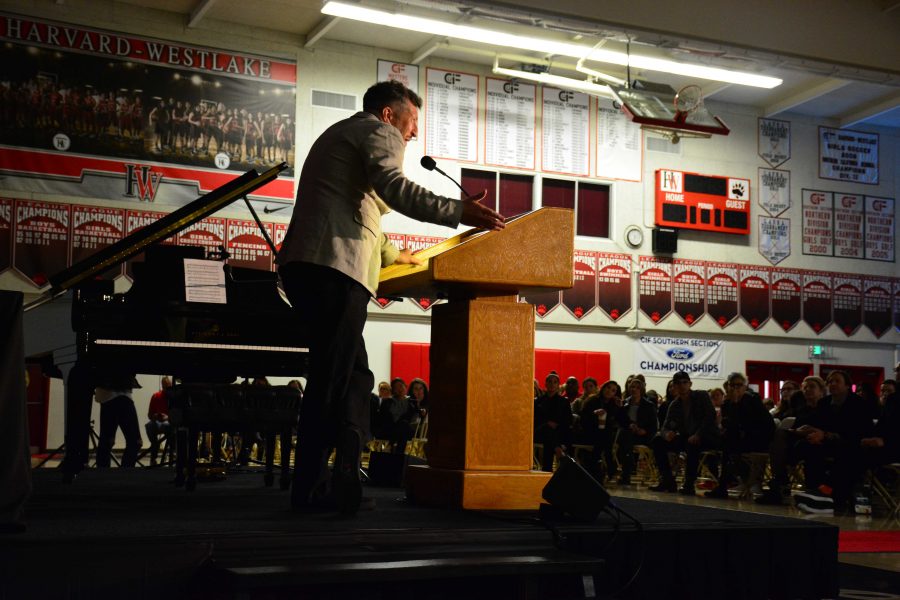World-renowned composer, pianist and conductor Thomas Adès performed pieces from his opera, “The Tempest,” and shared his experiences with international composition today at an upper school assembly as the annual Brown Family Speaker.
Adès began composing at 19 years old after winning second place at a national piano competition, in England. In 1995, his opera, “Powder Her Face,” brought him international recognition, and in 2013, he won a Grammy for his opera adaptation of Shakespeare’s “The Tempest,” which he wrote in 2004. Considered the most skilled and admired classical music artist of his generation, Adès is the only person to ever win the Royal Philharmonic Society Award for large-scale composition three times.
Harvard-Westlake President Rick Commons introduced Adès and the Brown Family Speaker series, an endowment by Linda and Adam Brown (Russel ’94 and David ’96) established in 2001 to bring “people of international consequence” to the school.
Adès said composers have a unique perspective during the opera, different from the director or actors. He chose to adapt “The Tempest” into an opera because it is the most musical of Shakespeare’s plays and also his favorite, he said.
“An opera is the tracing of an emotional journey from the beginning to the end through music,” Adès said. “The play is about air … What is music if not air we control to create an emotional experience.”
He showed the audience four video clips from the live production of the “The Tempest” and played two segments from piano compositions. Adès said a challenge during his creative process was reducing Shakespeare’s language in order to create a more concise message during the opera.
“I don’t think the brain would take in everything that was happening, so we had to reduce, or simplify what was being said,” Adès said. “I didn’t want it to be a tourism of past language. I wanted it to be as alive today as it was then … I wanted to have harmony.”
Since he composes the music for his operas, Adès said conveying his original message to his musicians is a “balance between precision and freedom.” Regardless of his instructions, it is always important to allow the orchestra room to interpret the music and contribute to the piece, he said.
“Operas, at the beginning, everything is distant, and everything is a knot,” Adès said of creating a cohesive story. “At the end, the knot is untied.”
During first and second periods, Adès also spoke to the Shakespeare class and the symphony class. English and Shakespeare teacher Jocelyn Medawar said she was excited for her students to hear Adès’ passion for adapting Shakespeare into an opera.
“Seeing how someone can take language and put it to music and translate the story into something else was fantastic,” Medawar said. “I loved his more personal reflections about the thrill of conducting and his statement about how the first language in Vienna was classical music.”
Shakespeare student and actor Carlos Guanche ’16 said Adès was charismatic and quick to laugh when he spoke to the class.
“He made good points about how there has to be a point of dramatic tension [in an opera] that either breaks or is made, so I think I’m going to look for those moment in my own characters,” Guanche said.
After the assembly, Head of Upper School Audrius Barzdukas also said Adès’ message of hard work and freedom was enlightening and applied to everyday life as a Harvard-Westlake student.
“His intellectual examination of emotion really spoke to the school message of empowering students and giving them the tools to explore the important aspects of their own lives,” Barzdukas said.



























